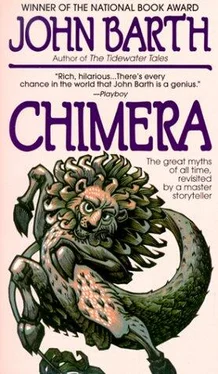John Barth - Chimera
Здесь есть возможность читать онлайн «John Barth - Chimera» весь текст электронной книги совершенно бесплатно (целиком полную версию без сокращений). В некоторых случаях можно слушать аудио, скачать через торрент в формате fb2 и присутствует краткое содержание. ISBN: , Жанр: Юмористическая фантастика, на английском языке. Описание произведения, (предисловие) а так же отзывы посетителей доступны на портале библиотеки ЛибКат.
- Название:Chimera
- Автор:
- Жанр:
- Год:неизвестен
- ISBN:9780449211137
- Рейтинг книги:5 / 5. Голосов: 1
-
Избранное:Добавить в избранное
- Отзывы:
-
Ваша оценка:
- 100
- 1
- 2
- 3
- 4
- 5
Chimera: краткое содержание, описание и аннотация
Предлагаем к чтению аннотацию, описание, краткое содержание или предисловие (зависит от того, что написал сам автор книги «Chimera»). Если вы не нашли необходимую информацию о книге — напишите в комментариях, мы постараемся отыскать её.
Chimera — читать онлайн бесплатно полную книгу (весь текст) целиком
Ниже представлен текст книги, разбитый по страницам. Система сохранения места последней прочитанной страницы, позволяет с удобством читать онлайн бесплатно книгу «Chimera», без необходимости каждый раз заново искать на чём Вы остановились. Поставьте закладку, и сможете в любой момент перейти на страницу, на которой закончили чтение.
Интервал:
Закладка:
" 'Never!' my sister declared. 'The only pleasure I'll take in that bed is the pleasure of saving my sisters and cuckolding their killer.'
"The Genie shrugged and faded; Shahryar came in, bid us good evening, kissed Sherry many times before caressing her more intimately, then laid her on the bed and worked her over playfully in as many positions as there are tales in the Trickery-of-Women series, till I couldn't tell whether her outcries were of pain, surprise, or — mad as the notion seemed — a kind of pleasure despite herself. As for me, though I was innocent of men, I had read in secret all the manuals of love and erotic stories in Sherry's library, but had thought them the wild imaginings of lonely writers in their dens, a kind of self-tickling with the quill such as Sherry herself had fallen into; for all it was my own sister I saw doing such incredible things in such odd positions, it would be many nights before I fully realized that what I witnessed were not conjured illustrations from those texts, but things truly taking place.
" 'On with the story,' Shahryar commanded when they were done. Unsteadily at first, but then in even better voice than the night before, Sherry continued the Merchant-and-Genie story, and I, mortified to find myself still moistening from what I'd seen, almost forgot to interrupt at the appropriate time. Next day, as we embraced each other, Sherry admitted that while she found the King himself as loathsome as ever, the things he did to her were no longer painful, and might even be pleasurable, as would be the things she did to him, were he a bedpartner she could treasure as our Genie treasured his. More exactly, once the alarm of her defloration and her fear of being killed in the morning began to pass, she found abhorrent not Shahryar himself — undeniably a vigorous and handsome man for his forty years, and a skillful lover — but his murderous record with our sex, which no amount of charm and tender caressing could expunge.
" 'No amount at all?' our Genie asked when he appeared again, on cue, at sunset. 'Suppose a man had been a kind and gentle fellow until some witch put a spell on him that deranged his mind and made him do atrocious things; then suppose a certain young lady has the power to cure him by loving him despite his madness. She can lift the spell because she recognizes that it is a spell, and not his real nature. .'
" 'I hope that's not my tale for tonight,' Sherry said dryly, pointing out that while Shahryar may once upon a time have been a loving husband, even in those days he gave out virgin slave-girls to his friends, kept a houseful of concubines for himself, and cut his wife in half for taking a lover after twenty years of one-sided fidelity. 'And no magic can bring a thousand dead girls back to life, or unrape them. On with the story.'
" 'You're a harder critic than your lover,' the Genie complained, and recited the opening frame of the Fisherman and the Genie, the simplicity of which he felt to be a strategic change of pace for the third night- especially since it would lead, on the fourth and fifth, to a series of tales-within-tales-within-tales, a narrative complexity he described admiringly as 'Oriental.'
"So it went, month after month, year after year; at the foot of Shahryar's bed by night and in Scheherazade's by day, I learned more about the arts of making love and telling stories than I had imagined there was to know. It pleased our Genie, for example, that the tale of the Ensorcelled Prince had been framed by that of the Fisherman and the Genie, since the prince himself had been encased (in the black stone palace); also, that the resolution of the story thus enframed resolved as well the tale that framed it. This metaphorical construction he judged more artful than the 'mere plot-function' (that is, preserving our lives and restoring the King's sanity!) which Sherry's Fisherman-tale and the rest had in the story of her own life; but that 'mere plot-function,' in turn, was superior to the artless and arbitrary relation between most framed and framing tales. This relation (which to me seemed less important than what the stories were about) interested the two of them no end, just as Sherry and Shahryar were fascinated by the pacing of their nightly pleasures or the refinement of their various positions, instead of the degree and quality of their love.
"Sherry kissed me. 'That other either goes without saying,' she said, 'or it doesn't go at all. Making love and telling stories both take more than good technique — but it's only the technique that we can talk about.'
"The Genie agreed: 'Heartfelt ineptitude has its appeal, Dunyazade; so does heartless skill. But what you want is passionate virtuosity.' They speculated endlessly on such questions as whether a story might imaginably be framed from inside, as it were, so that the usual relation between container and contained would be reversed and paradoxically reversible — and (for my benefit, I suppose) what human state of affairs such an odd construction might usefully figure. Or whether one might go beyond the usual tale-within-a-tale, beyond even the tales-within-tales-within-tales-within-tales which our Genie had found a few instances of in that literary treasure-house he hoped one day to add to, and conceive a series of, say, seven concentric stories-within-stories, so arranged that the climax of the innermost would precipitate that of the next tale out, and that of the next, et cetera, like a string of firecrackers or the chains of orgasms that Shahryar could sometimes set my sister catenating.
"This last comparison — a favorite of theirs — would lead them to a dozen others between narrative and sexual art, whether in spirited disagreement or equally spirited concord. The Genie declared that in his time and place there were scientists of the passions who maintained that language itself, on the one hand, originated in 'infantile pregenital erotic exuberance, polymorphously perverse,' and that conscious attention, on the other, was a 'libidinal hypercathexis' — by which magic phrases they seemed to mean that writing and reading, or telling and listening, were literally ways of making love. Whether this was in fact the case, neither he nor Sherry cared at all; yet they liked to speak as if it were (their favorite words), and accounted thereby for the similarity between conventional dramatic structure — its exposition, rising action, climax, and dénouement — and the rhythm of sexual intercourse from foreplay through coitus to orgasm and release. Therefore also, they believed, the popularity of love (and combat, the darker side of the same rupee) as a theme for narrative, the lovers' embrace as its culmination, and post-coital lassitude as its natural ground: what better time for tales than at day's end, in bed after making love (or around the campfire after battle or adventure, or in the chimney corner after work), to express and heighten the community between the lovers, comrades, co-workers?
" 'The longest story in the world — ' Sherry observed, ' The Ocean of Story , seven hundred thousand distichs — was told by the god Siva to his consort Parvati as a gift for the way she made love to him one night. It would take a minstrel five hundred evenings to recite it all, but she sat in his lap and listened contentedly till he was done.'
"To this example, which delighted him, the Genie added several unfamiliar to us: a great epic called Odyssey , for instance, whose hero returns home after twenty years of war and wandering, makes love to his faithful wife, and recounts all his adventures to her in bed while the gods prolong the night in his behalf; another work called Decameron , in which ten courtly lords and ladies, taking refuge in their country houses from an urban pestilence, amuse one another at the end of each day with stories (some borrowed from Sherry herself) as a kind of substitute for making love — an artifice in keeping with the artificial nature of their little society. And, of course, that book about Sherry herself which he claimed to be reading from, in his opinion the best illustration of all that the very relation between teller and told was by nature erotic. The teller's role, he felt, regardless of his actual gender, was essentially masculine, the listener's or reader's feminine, and the tale was the medium of their intercourse.
Читать дальшеИнтервал:
Закладка:
Похожие книги на «Chimera»
Представляем Вашему вниманию похожие книги на «Chimera» списком для выбора. Мы отобрали схожую по названию и смыслу литературу в надежде предоставить читателям больше вариантов отыскать новые, интересные, ещё непрочитанные произведения.
Обсуждение, отзывы о книге «Chimera» и просто собственные мнения читателей. Оставьте ваши комментарии, напишите, что Вы думаете о произведении, его смысле или главных героях. Укажите что конкретно понравилось, а что нет, и почему Вы так считаете.












